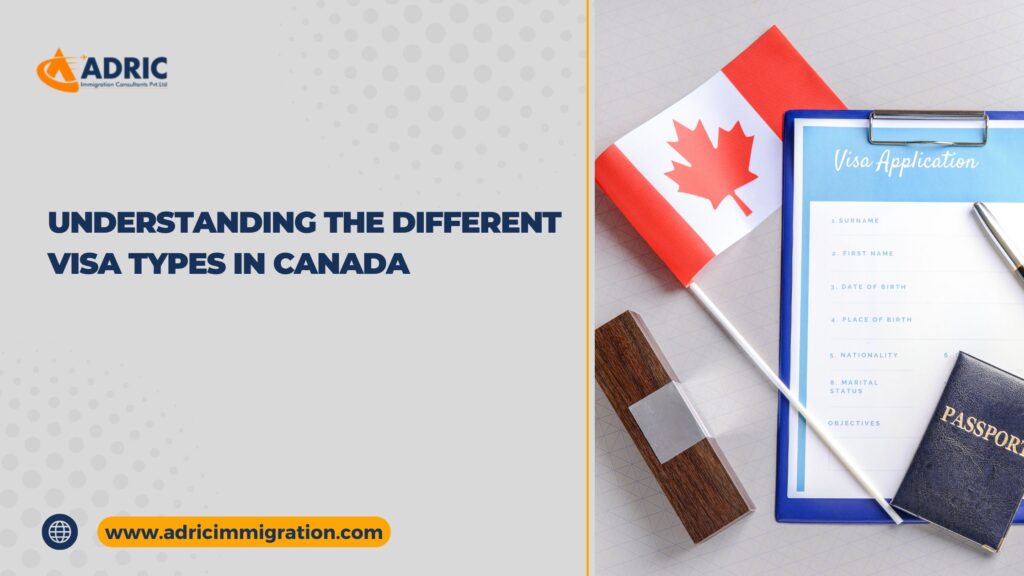Canada is a dream destination for many, offering abundant opportunities for work, study, and leisure. With its scenic landscapes, thriving economy, and welcoming immigration policies, it’s no wonder so many aspire to visit or move to Canada. Understanding the various visa types available is essential to ensure a smooth and successful application process. Adric Immigration, a trusted immigration consultant in bangalore, is here to help you navigate this complex system with ease. Let’s dive into the different visa types of Canada and their purposes.
Different Visa Types in Canada
1. Temporary Resident Visa (TRV)
A Temporary Resident Visa, often referred to as a visitor visa, is required for individuals who want to visit Canada for a short period.
Purpose:
- Tourism and leisure
- Visiting family or friends
- Short-term business activities
Key Points:
- TRVs are typically valid for up to six months.
- Some nationalities are exempt from obtaining a TRV, depending on Canada’s visa waiver agreements.
- Applicants may need to show proof of financial stability and a clear intention to return to their home country after their visit.
2. Study Permit
Canada is home to some of the world’s best educational institutions, making it a top choice for international students.
Purpose:
- Pursuing academic programs or vocational training in Canada
Key Points:
- A study permit is not a visa but allows students to live and study in Canada. You may also need a TRV or an Electronic Travel Authorization (eTA) depending on your nationality.
- Many study permits allow students to work part-time during their course and full-time during breaks.
- Proof of admission to a Designated Learning Institution (DLI) is mandatory to apply.
3. Work Permit
Canada’s robust economy attracts skilled workers from around the world. A work permit allows individuals to work temporarily in Canada.
Types of Work Permits:
- Employer-Specific Work Permit: Tied to a specific employer and job.
- Open Work Permit: Allows individuals to work for any employer in Canada.
Key Points:
- You may need a job offer supported by a Labour Market Impact Assessment (LMIA).
- Spouses of work permit holders may also be eligible for open work permits.
- Work experience gained can help in transitioning to permanent residency.
4. Permanent Residency (PR) Visas
For those looking to settle in Canada permanently, a PR visa is the ultimate goal.
Pathways to PR:
- Express Entry System: Includes the Federal Skilled Worker Program, Canadian Experience Class, and Federal Skilled Trades Program.
- Provincial Nominee Program (PNP): Specific provinces nominate skilled workers based on their needs.
- Family Sponsorship: For family members of Canadian citizens or permanent residents.
Key Points:
- PR holders can live, work, and study anywhere in Canada.
- They enjoy benefits like healthcare and social services.
- After a few years, PR holders can apply for Canadian citizenship.
5. Business Visa
Canada offers business visas to attract entrepreneurs, investors, and self-employed individuals who can contribute to its economy.
Types of Business Visas:
- Start-Up Visa: For entrepreneurs with innovative business ideas supported by designated organizations.
- Self-Employed Program: For individuals with relevant experience in cultural or athletic activities.
Key Points:
- A solid business plan and financial stability are essential.
- Applicants must demonstrate their ability to contribute to the Canadian economy.
6. Visitor Visa for Parents and Grandparents (Super Visa)
The Super Visa is a long-term visa specifically for parents and grandparents of Canadian citizens or permanent residents.
Key Points:
- Valid for up to 10 years, allowing stays of up to two years at a time.
- Applicants must have medical insurance and meet specific income requirements.
7. Refugee and Asylum Visas
Canada’s commitment to humanitarian efforts is evident through its refugee and asylum programs.
Purpose:
- Protect individuals fleeing persecution, war, or violence in their home countries.
Key Points:
- Applicants must meet the United Nations Refugee Agency’s criteria.
- Approved refugees receive support for housing, healthcare, and integration.
8. Electronic Travel Authorization (eTA)
An eTA is a digital entry requirement for visa-exempt travelers flying to Canada.
Key Points:
- Linked to your passport and valid for up to five years.
- Quick and easy to apply online.
- Ensures that travelers meet Canada’s entry requirements.
How to Choose the Right Visa
Selecting the appropriate visa depends on your purpose of visit, duration of stay, and long-term goals. Consider these steps:
- Assess Your Goals: Are you visiting, studying, working, or planning to settle permanently?
- Understand Eligibility Criteria: Review the specific requirements for the visa category that matches your purpose.
- Seek Expert Advice: Consult an immigration expert to guide you through the process.
Why Seek Professional Guidance?
Navigating Canada’s immigration system can be daunting. A single error in your application can lead to delays or rejection. This is where professional consultants like Adric Immigration come into play. Their expertise ensures your application is accurate and complete, saving you time and stress.
Conclusion
Visa types in canada cater to various needs, from temporary visits to permanent settlement. Whether you aim to study at a top university, contribute to the economy through work, or reunite with family, there’s a pathway for you. Understanding the requirements and processes is crucial for a successful application.
For personalized assistance and a hassle-free experience, reach out to Adric Immigration, your trusted partner in achieving your Canadian dreams. Their team of experts will ensure you’re on the right track, making your journey to Canada seamless and rewarding.
Contact Adric Immigration for the best Canada immigration services in Bangalore. With our experienced consultants and personalized guidance, we simplify the immigration process, ensuring a smooth journey toward achieving your dreams of living, working, or studying in Canada.

